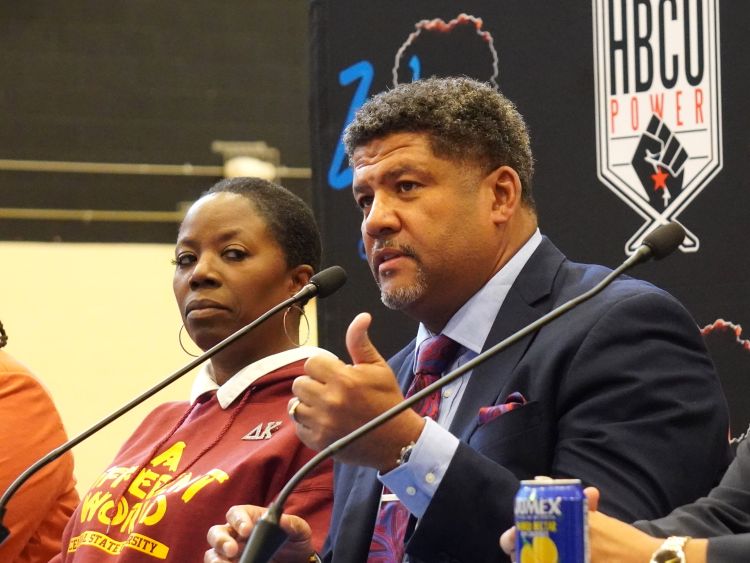The benefits of attending Historically Black colleges and universities and the importance of representation in higher education were two key areas of focus during the recent HBCU Power Panel at Innovation Central High School.
HBCU Power is an organization that connects would-be students to HBCUs and highlights achievements of students and alumni. The event brought in a group of local leaders to talk about their experiences with HBCUs. Students from Innovation Central and Grand Rapids Montessori high schools attended.
“We’re excited to host this event because we believe that representation matters,” Innovation Central Principal Derek Martin told students prior to the panel. “Exposure … to HBCUs can help shape the way you see yourself and your community. Events like this are important because they remind us of what’s possible.”
The panel included GRPS Superintendent Leadriane Roby; HBCU Power partner Jash’d Belcher; Corewell Health Senior Director of Diversity, Equity & Inclusion Valissa Armstead; Urban League of West Michigan President and CEO Eric Brown; STEM Greenhouse founder Dr. Keli Christopher; and Shannon Harris, executive director of Our Children’s Community.
‘When I went to Hampton, it was the first time that I saw people who looked like me, from professors to other students to the president of the college.’
— Superintendent Leadriane Roby
Moderated by 82nd Dist. State House Rep. Kristian Grant and Zion Belcher-Arill, a member of the Puerto Rico women’s national basketball team, the panel was organized to show students that HBCUs are a “critical part of our educational experience,” said Roby.
“On these campuses, you experience things you may not see in other places,” Roby said. “It’s transformational. … I know this firsthand.”
Sharing Experiences
Roby, who attended Hampton University in Virginia, said her experience there had a lasting impact.
“When I went to Hampton, it was the first time that I saw people who looked like me, from professors to other students to the president of the college, and that was transformative because I started to look at myself differently and had a different sense of pride around what I could do and who I could be in the future,” she said.
Brown, who used athletics to forge a path to Southern University, said his time at the school permanently changed his outlook for the better.
“It transformed me from the inside out,” he said. “It gave me a cultural experience immersed in an institution of higher academic learning that was not anti-anything, but it was definitely pro-Black.”
Christopher noted that while HBCUs were founded with Black people in mind — specifically to offset a lack of educational opportunities for Black people — they don’t discriminate, and they are open to everyone.
The panelists also discussed college applications, scholarships, in-state and out-of-state tuition, and the value of a college degree in the working world.
Showing Students What’s Possible
Samya Alford, a sophomore at Innovation Central, said the panel made her rethink her approach to college.
“Initially, I was kind of iffy about going to an HBCU, and it wasn’t really something that was on my mind,” she said. “But the more they talked about it the more it seemed like something I’d be interested in.
“It seems like a very positive environment to be in, especially as a person of color.”
Despite her original plan to stay close to home after high school, Samya said she’s now giving more thought to attending an HBCU. The institutions, she said, “seem like they have something I might like and enjoy more than what the colleges around me offer.”

